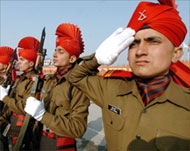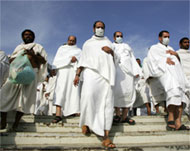Saudi king’s India visit ‘historic’
King Abdullah Bin Abdul Aziz of Saudi Arabia will be a guest of honour when he attends India’s Republic Day celebrations in New Delhi, but many are asking why it has taken a Saudi monarch 51 years to visit the country.

The four-day visit beginning on 24 January has been hailed as historic, and is expected to clinch a host of bilateral trade agreements particularly relating to energy, information technology, science and education.
Politically, the king’s visit is considered significant due to Saudi Arabia’s leading role in the Islamic world as custodian of the two holy shrines (in Makka and Medina) and its impact on India’s 140 million Muslims, the second largest Muslim population in the world after Indonesia.
E Ahamed, India’s external affairs minister, told Aljazeera.net: “India and Saudi Arabia have had close and deep-rooted friendship and His Highness’s visit to India will cement our robust economic and emotional ties that have grown steadily over the last five decades since King Saud came here.”
The minister denied that the long gap between the visits by King Saud and King Abdullah had any political undertones.
Trade delegations
“Our bilateral relations have never been less than warm; there has been a steady exchange of high-level visits between the two nations and the visit by a head of state is no reflection on the ties,” Ahamed said.
Besides Ahmed, India’s finance and petroleum ministers also visited Riyadh last year and the Saudi oil minister was in Delhi earlier this month.
Last week, the Indian government approved a bilateral investment promotion and protection agreement, finalised after six rounds of negotiations over a year, as a run-up to the king’s visit.
The agreement provides for extending the Most Favoured Nation (MFN) treatment to foreign investors, a clause that expedites returns and allows international arbitration in case of dispute between the host country and the investor, in this case Saudi Arabia.
Pakistan, Kashmir factors
Karan Singh, chief of the ruling Indian National Congress Party’s foreign policy wing, believes the close Saudi-Pakistan ties may have contributed to India’s relations with the kingdom not becoming “as warm as they could have been”.
“[The] Saudis realise India’s valuable friendship and the role it can play in re-balancing the international situation and the visit will contribute to a new approach to the problems in West Asia,” he said.
 |
|
The king will be guest of honour |
While the official air about the proposed visit is optimistic, the Indian Kashmir-based separatist All Party Hurriyat Conference has different aspirations.
Mirwaiz Umar Farooq, Hurriyat chairman, reportedly told his colleagues that King Abdullah has assured him about raising the Kashmir issue with the Indian leadership.
However, Ahamed said India was not concerned by such reports.
“King Abdullah is not merely an experienced ruler but a statesman who would appreciate India’s stated position on Kashmir.”
India and Pakistan each claim the Himalayan region of Kashmir as an integral part of their nations. The dispute has kept ties between the neighbours tense for almost six decades and triggered two of their three wars since 1947.
When India has broached the issue internationally it has only done so to highlight Pakistan sponsored “cross border terrorism” in the Indian part of Kashmir.
Historic ties
In 1982, when Indira Gandhi, the then prime minister, visited Riyadh, the last by an Indian ruler, there were just 250,000 Indians living and working in Saudi Arabia. Today, 1.5 million Indians there account for half of the total of $8 billion remittances coming from the Gulf.
According to official figures, about 60 Indian telecom, petrochemical and pharmaceutical companies have been given licences under the direct foreign investment schemes in Saudi Arabia in the last couple of years and are expected to yield business worth $360 million.
 |
|
Thousands of Indians visit Saudi |
The kingdom, sitting over a quarter of the world’s known oil reserves, has also been a major oil supplier to India.
In 1990, just prior to the Iraqi invasion of Kuwait, both countries supplied 10 million tonnes or 70 million barrels of oil annually to India.
Today, Saudi Arabia has almost replaced Iraq and Kuwait as one of the major sources of oil. Annual trade between the two countries stands at $5 billion out of which Indian oil imports account for $4 billion. About 30 % of India’s energy needs are met by oil and 60% of the oil is imported.
On the other hand, India is one of the fast growing economies and its manufacturers and traders are moving with increasing confidence into international markets, especially in the Gulf.
Underlining India’s emotional ties with Saudi Arabia, Ahamed pointed to the steadily growing number of Hajj pilgrims from India, about 200,000 this year.
On Thursday, the Indian government also declared its resolve to sign an agreement with Saudi Arabia seeking its cooperation in combating organised crime, especially international terrorism and drug trafficking, indicating its political expectations of the guest.